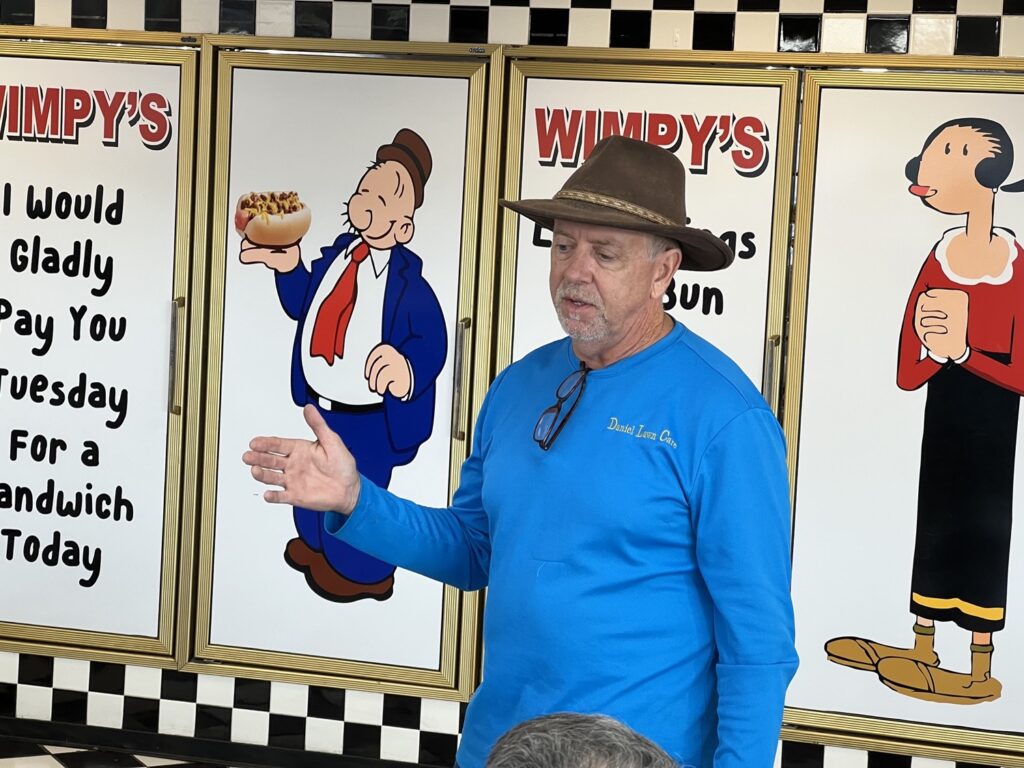Kent Daniel was the guest speaker at the Sapulpa Chamber’s monthly Business Over Breakfast last Thursday morning, where he gave a talk about Sapulpa’s petunia program, as well as the City’s progressive approach to making downtown more nature-friendly and how it can help attract tourism.

The man who’s been doing plant care and landscaping for more than a quarter century began by admitting to everyone present: “I’m not a great horticulturist,” adding that he actually worked 35 years in a career involving metallurgy and steel, and had the opportunity to travel the world while doing so. He says his calling to a more nature-inspired profession came about because of his dissatisfaction with his employer’s way of doing things. “I got really tired of the way businesses were not building people, they were just trying to build profits. I decided I was done. I wanted something else.”
So he left the corporate world behind to start a lawn care business. “People were like, ‘Oh my gosh, you gave up a huge salary for this?’ Well no, it’s actually rewarding when you can do something that may not make you a lot of money, but it’s something you enjoy.”
Daniel’s roots in his passion for plants run deep. “I was raised with an organic mom that was nuts,” he said as the audience chuckled. “I mean, she was crazy about plants, about growing our own food, and that’s where I learned early on about natural pesticides.”
It was that natural strength of understanding he had in flowers, plants and gardening pesticides that led to him getting the gig he has now of caring for most of Sapulpa’s greenery. “(Former Chamber President) Suzanne (Shirey) talked to me one day and wanted to know if I’d take over the flower program and I said yeah, I’ll try to.”
At the time, Sapulpa had ten gray plastic pots and 20 16-inch hanging baskets. In the first year, the program failed to produce enough quality, so he began making cautious changes. “Those gray Route 66 pots are actually water chamber pots that are filled with water. They made somebody a lot of money—the idea was that you’d only have to water the plant every two or three weeks. But it’s like a pond; it breeds bacteria, funguses, and all that stuff.”
He decided to remove the liners and water from the pots and fill them with grow mix. According to Daniel, the water chamber pots, while they seem like a time-saving solution, actually work in opposition to the natural way a plant takes in nutrients. “Plants don’t do real well when you take nutrients from the bottom up, okay?” he told the crowd. “Nature tells (the plant) it needs to be vibrated. It needs the nutrients to flow down through the roof. So that’s how it picks up the microbes pick up and break down these nutrients.”
After updating the pots and enlarging the hanging baskets, Daniel’s flower management really began to bloom, so to speak.
Five years ago, Kent Daniel started with those 30 spots and 202 petunias. Fast forward to this season and the success speaks for itself. “I lost count at 1700 petunias. We have roughly 100 locations.” At the end of the season, Daniel and his team give away the petunias when they pull them up for the season in October. Last year, cars lined up the street to get some of Kent’s supertunias. He says the remarkable success comes in part because they try to “control the growth,” as he puts it. “We don’t get in a hurry,” he said. “We don’t want to have our racehorse get out of the gate and run a quarter-mile, we want to run a mile.” This kind of carefully planned feeding and watering program keeps the petunias looking better, for longer. “We push them into October. We get five months of growing.”
Aside from what has become a very successful flower program. Daniel is working to get more pollinator beds downtown, the kind that attract bees, butterflies and other pollinators. “Not to say that we want to have them everywhere,” he said, “but to show that as a town we’re concerned about the environment and about our pollinators.”
Daniel has partnered up with Carla Smith from the OSU Extension Office in Shawnee, and utilized her expertise in butterflies to implement three gardens in the downtown area—one at the Trolley Museum on East Dewey Avenue, one at the new Waypoint Lounge near Main Street and Thompson Avenue, and one at the “cemetery” of Diggum-Deep Mortuary on Hobson. All of these beds will take time to reach their full potential, but the Trolley station has enough square footage that it can be placed on the national Monarch Way Registry. It’s that kind of attention that will drive additional tourism to Sapulpa. “There are tens of thousands of people that do nothing except follow this (Monarch migration) path,” he said. “It’s their vacation. We have Route 66 to coincide with this. It’s a big thing, it’s becoming a really big thing.”
For Kent, a large part of what’s driving his passion to leave Sapulpa better than he found it is for the effect it’ll have on the younger generation. “They’re more of nature-loving generation,” he said. “So, if we’re going to tear something down, let’s make it a point to put a little bit of nature back into it, and market that,” he said. “That’s huge. It’s like getting a new fast food chain. It’s a big thing and it’s gonna get bigger.”
The Sapulpa usually has a Business Over Breakfast meeting each month. For more information, visit sapulpachamber.com









